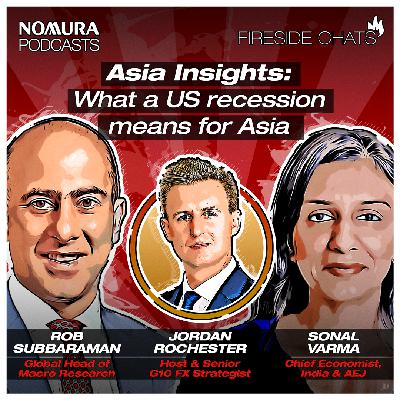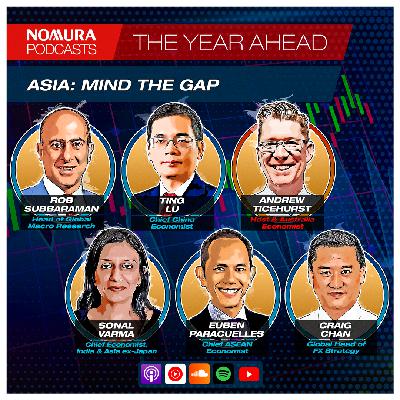Discover Nomura – The Week Ahead
Nomura – The Week Ahead

368 Episodes
Reverse
In this episode of our Fireside Chats series we’ll be talking with Rob Subbaraman and Sonal Varma from the Asia Economics team on what a US recession means for Asia and why EM is skating on thin ice. We'll discuss which countries in Asia are most exposed to Global recession risks and what the combination of high inflation but lower Global growth means for policy makers. Lastly, we discuss the risks around the outlook.
In this episode, we discuss cyber security as an ESG factor or governance risk with Jason Mortimer, Head of Sustainable Investment for Fixed Income at Nomura Asset Management. We examine the growing threat of cyber security, regulatory tightening, and why it should be on the minds of ESG investors. We also take note of how Nomura Asset Management's approach to cyber security risk helps investors avoid companies that may be overly exposed to cyber attacks, by integrating measures of cyber security performance in the credit analysis of companies to help clients make better investment decisions.
In this episode, we delve into global policy and regulatory themes for the year ahead with Andrew Bowley, Managing Director for Group Sustainability Strategy at Nomura. We examine whether ESG can regain the ground it lost in 2022 after banks threatened to leave key climate groups and asset managers faced pressure from investors and politicians over their primary duty to maximize returns. We also discuss the policy outlook in Japan with Kohei Okazaki, Nomura’s ESG policy expert. We discuss how Japan’s GX (green transformation) league may evolve and whether Japan will make progress on reducing its reliance on coal.
In this episode, we explore the outlook for sustainable M&A with Jeff McDermott, Global Co-Head of Investment Banking at Nomura. We hone in on the sectors to watch including carbon capture technologies and sustainable food, while considering whether the coming 12 months may be a tipping point for moving away from a fossil fuel economy. We also discuss the outlook for ESG bond deals with Jarek Olszowka, Nomura’s Head of Sustainable Finance. We examine how the green bond market will continue to flourish and whether social bonds may see increased inflows amid the prospect of a global recession and a cost-of-living crisis. We also touch on the trend towards biodiversity and Japan’s booming market for transition bonds.
In this episode of our ESG 360 podcast, we review the key takeaways from the ESG in East Asia series, including the shortcomings in current ‘S’ data and why the ‘S’ component is under-researched. We take note of the data for five big geographies in East Asia and where, in particular, Japan and South Korea stand broadly versus peer countries. We also discuss the business opportunities inherent in the ‘S’ factor and which industries came out top.
In this episode of ESG360, we explore how companies in East Asia need to rethink their working patterns and expectations for all employees in order to unlock the diversity dividend. We discuss how Diversity, Equity and Inclusion need to be considered as connected components within a company’s overall strategy. To transform diversity into inclusion, companies should provide personal and professional development opportunities, which enables all employees to realize their potential.
In this episode of ESG360, we explore some of the key discussions at the UN’s COP27 climate conference held between November 6-18, 2022 in Sharm El Sheikh, Egypt. Against the backdrop of Russia’s invasion of Ukraine, energy security concerns complicated discussions around climate change as come countries burned more fossil fuels in the short term while making plans to accelerate the rollout of renewables to reclaim their energy independence. Discussion centered around the creation of a loss and damages fund to compensate developing countries bearing the brunt of climate disasters. Reducing greenhouse gases like methane and a $20 billion deal to help Indonesia move away from coal were notable successes in contrast to thornier issues like phasing down all fossil fuels.
In this episode of ESG360, we explore how companies in East Asia are tackling the challenge of gender diversity in the workplace and embracing disabled workers. Amid a long period of economic prosperity, East Asia is facing a shortage of workers due to demographic factors, which could help its companies become more inclusive as they look to fill the gap
In this episode of ESG360, we explore how factors such as climate change, a population explosion and food security are driving AgTech solutions like insect protein and lab-grown meat. Food and agriculture represents 25% of global greenhouse gas emissions and farming is responsible for about 70% of global water use making innovation in this area critical if the world stands a chance of reaching Net Zero by 2050.
In this episode of ESG360, we explore the five factors behind electricity shortages in Japan and how they can be tackled. We also discuss part 4 of our ESG in East Asia series, which focuses on how companies in South Korea can adapt to counter demographic challenges like an aging population and low birth rate.
In this episode of ESG360, we take a look at the resilience of green energy stocks amid a broad-based stock market downturn in the first half of the year. A further interesting point is that solar stocks have performed better than wind as some of these companies are not yet profitable highlighting the challenge investors face in their efforts to advance the green transition. We also cover the development of carbon markets in Japan and part 3 of our ESG in East Asia series, which focuses on navigating social data in South Korea and reveals the industries that disclose the most data.
In this episode of ESG360, we cover Employment Standards and how the best firms try to align their employees’ values and objectives with their own. We also reveal how one South Korean company’s increase in revenue per employee came at the environmental cost of a rise in greenhouse gas emissions per employee.
In this episode of ESG360, Dr Peter Matanle, Senior Lecturer at the University of Sheffield’s School of East Asian Studies speaks about a bold new project combining the commercial expertise of Nomura with the University of Sheffield’s prestigious School of East Asian Studies to deepen and broaden knowledge about a comparatively underdeveloped area of financial services research: ESG in East Asia: The ‘S’ Factor. In part 1, Peter talks about the history and social principles behind the S in ESG including Asia’s long tradition of stakeholder inclusion. Japan’s model of welfare capitalism emerged in the inter-war years out of a combination of traditional values and firms needing to retain scarce high quality human capital. Early espousers of such an ethos were the 19th century capitalist Eichi Shibusawa, and Konosuke Matsushita, who founded and developed the Panasonic brand. There is now widening acknowledgement that corporations are embedded in complex interdependent environmental, political-economic, and socio-cultural systems which they have profound effects upon, and which they gain from economically. Consequently, concern over their ‘socializing the cost and privatizing the profit’ has deepened.
In this episode of ESG360, Joe Mezrich, Nomura’s Head of Equities Quantitative Strategy, shares his insights on how to fix the underperformance of U.S. `quality’ investing. Joe’s research found that stocks of high quality U.S. companies like those with good return on equity, have a long record of underperformance even though quality stocks have outperformed in other developed markets. But by adding good ESG features, a losing strategy can be transformed into a winning one, highlighting that quality scores often use measures of financial quality that miss important company features, like governance issues, which form a complete quality picture.
In this episode of ESG360, we bring on Alex Wotton, Co-Head of Nomura Greentech, Industrials and Infrastructure in EMEA to discuss Europe’s plan to reduce its reliance on Russian fossil fuels and what that means for the energy transition. The war in Ukraine may prove to be a watershed moment in the fight against climate change if it succeeds in catalysing countries to accelerate a move to greener power motivated by energy security. The war has underscored how geopolitics is inextricably linked to energy policy and climate outcomes. In March, the European Commission unveiled its ‘REPowerEU’ plan, a blueprint to reduce the bloc’s energy dependencies over concerns that Moscow could turn off gas supplies in retaliation to sanctions from the EU and US, and to avoid indirectly funding the invasion by buying Russian fossil fuels. Measures include quicker deployment of wind and solar, further developing a hydrogen market and streamlining authorisations to fast-track new power projects.
In this episode of ESG360, we discuss the EU’s social taxonomy with Ella Chalfon, a managing director in Nomura’s Sustainable Finance team. The taxonomy gives the EU an opportunity to be a leader in determining what ‘good’ looks like on social issues while encouraging new investment in socially beneficial enterprises. It also provides a yardstick for investors to benchmark companies and hold them accountable on their social credentials. Victoria Collins, Nomura’s Head of Climate Risk, also joins us to talk about how financial firms are managing climate risks arising from extreme weather like the $1.5 billion in damage caused by recent deadly flooding in Australia and how they are treating so-called stranded assets like coal-fired power stations when demand plummets. We also touch on the ESG implications in Ukraine, including how investors with a social mandate can address the unfolding humanitarian crisis, and the escalating risks from political instability and a change in country ratings.
In this episode of ESG360, we discuss solar power with Vinod Mukani, head of the Infrastructure and Power Business at Nomura. Solar energy has been making great strides in recent years as pressure builds on countries to reach net zero emissions goals. The latest available data from the International Renewable Energy Agency shows that solar capacity increased 22% to 127 gigawatts in 2020 compared to 2019. It’s projected to reach $223 billion by 2026. Nomura recently acted on an innovative solar and battery storage financing for AMP Energy, a renewables specialist. The deal highlights 3 key trends and challenges. Firstly, the maturity and stability of solar photovoltaic panels has made them among the cheapest forms of energy production. Secondly, the renewables markets is global but jurisdictional nuances make financing a challenge, in particular the way renewables are subsidized vary between countries. Finally, there’s great demand for tailored financing whether it’s for distributed solar that’s produced using rooftop systems or community solar projects that power multiple properties from a central source.
In this episode of ESG360, we discuss green taxonomies with Andrew Bowley, Wholesale Governance Officer at Nomura. In a controversial move, the EU has allowed natural gas and nuclear into its green taxonomy. The decision has caused uproar among climate activists who accuse policy-makers of greenwashing and undermining efforts to accelerate the green transition. We also discuss social bonds with Nomura’s Mark Yeomans, a specialist in ESG debt. Asia’s social bond market has been rising rapidly amid a flurry of recent deals including a health bond for the Asian Development Bank fueling optimism in the region after the setback of the Covid-19 pandemic.
In this first episode of ESG360, we’ll be discussing what’s in store for 2022. Jeff McDermott, Global Co-head of Investment Banking will give his best predictions for green M&A while Gordon Youl, Head of ESG Solutions for AeJ, explains why this year is key for China. Andrew Bowley, Wholesale Governance Officer, looks into his crystal ball on regulation, and Jarek Olszowka, Head of Sustainable Finance, discusses the record-breaking growth of ESG bonds.
In the first of our 2026 Outlook episodes, our Economists in Asia discuss Nomura's key macro and market views for the region in the year ahead. In China, we discuss the "great divide" and the challenging backdrop for policy makers. For India, we expect another Goldilocks year, with strong cyclical growth, low inflation and another RBI rate cut. Across the broad region, we forecast a year of divergence, with technology and domestic demand divergences, creating leaders and laggards. We also welcome Craig Chan, our Global Head of FX Strategy, who outlines some thoughts on the US dollar, where we see some downside medium term risk, and a couple of potential medium-term winners.








The Week Ahead - Speaking as a retail investor and somebody who’s interested in global finance and economics, this is probably the best Podcast for providing an informed view of what’s affecting the global economic environment and financial markets in the next week. Areas covered are topical and varied, but always informative. The presentation style of the host and guests is casual, but succinct. If I where recommending one Podcast for individuals interested in investing or finance, this would be it. If there’s a negative aspect, I would like to know what music the host uses between articles, some are rather good.